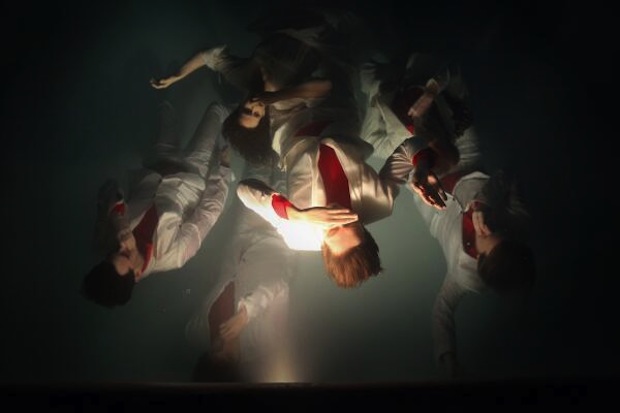Arcade Fire- Reflektor
8.9 / 10
“Do you like Rock & Roll musik? Cuz I don’t know if I do” front man Win Butler despondently and wryly snarls on Arcade Fire’s fourth record Reflektor. It’s bold but that may be a summation to how Arcade Fire went on a mission to deconstruct the apparent stench of conventionalism they felt wafting over them, perhaps feeling pigeonholed by their own merits and achievements. Arcade Fire know what’s at stake, despite the current state of Rock music being fragile as ever the risks have to be bigger and more audacious to really leave an impression. They aren’t about to rest on past accolades and acclaim so on Reflektor they forage out into new territories, burning old blueprints to the ground and dancing through the ashes.
For inspiration Butler traveled to Haiti with his wife and band mate, multi-instrumentalist Régine Chassagne. Butler claimed it opened him up to Caribbean music and rhythms previously off his radar. The band also sought to collaborate with former LCD Soundsystem front man James Murphy who ended up assisting in the production. His indelible touchstones are absolutely evident over the course of this sprawling work. Murphy’s influence along with the Haitian exposure leads to Arcade Fire’s most expansive and profound record yet.
Reflektor is interlinked like one long prose poem with some songs flowing seamlessly into the other. The band refracts and shatters the light to its will like a wondrous prism in the opus of the opening title track. At 7:34, it’s a jarring disco-punk epic, like nothing they’ve really delved into and yet at the very nucleus of it all, it’s still distinctly Arcade Fire. It’s a hybrid concoction of sorts now able to stand on its own legs, blood still pumping with arena-rock grandeur. Butler sings, “We fell in love, alone on a stage, in the reflective age” while Régine spirals neon webs around him cooing in French, “Between the night, the night and the dawn. Between the kingdom of the living and the dead.” The lyrics are still flooded with Springsteen-esque getaway car/young lovers and loners on the run hormones but sonically it’s a cacophonous conglomeration prefacing the rest of the record. Congas meld with horns and synth arrangements as android gurgles and hisses filter through the circuits. Hell, even David Bowie is in there somewhere (Seriously)! “We Exist” boasts an irresistible decadent ‘80s groove as if “Billie Jean” had just morphed into an undulating extraterrestrial spectacle. “Flashbulb Eyes” is a Reggae voodoo shudder as Butler paranoid as ever shivers, “What if the camera really do take your soul?” “Here Comes The Night Time” surges forward with anxious tumult before waves break to reveal a Haitian merengue with Butler pondering one of his many existential questions, “But if there’s no music in heaven, then what’s it for?” “Normal Person” has the billowing maelstrom and muscle of cranky latter day Neil Young as guitars crackle and caterwaul in what may be their most surly rocker to date. “You Already Know” is the closest the band comes to a pop structured song here with a jaunty gleam before “Joan of Arc” closes out the first volume with its crusading glam stomp. Butler’s blusterous yet affectionate lyrics are no doubt an ode to Régine, “When the boys are over you, Joan of Arc, tell the boys I’ll follow you. I follow you. Joan it’s true, I really wanna know you.”
A reprise opens volume 2 in “Here Comes The Night Time Part II” bathed in gentle washes of baroque pop with a cascading computer-drip pulse before giving way to the 2nd half’s centerpiece combo of “Awful Sound (Oh Eurydice)” and “It’s Never Over (Hey Orpheus)” complement one another as a retelling of the Greek tragedy of Orpheus and Eurydice. Orpheus goes down into the underworld to bring back his beloved Eurydice from the dead. In the first moments of seeing daylight however he turns to see his Eurydice and she has vanished back into the underworld, gone forever. Being the big proponents of light as a muse in much of their songs it’s easy to see why they were attracted to this devastating tale. The former begins with tribal percussion before swelling into a soaring paean while the latter is the palpitating finality and the beacon of light is now only a hollow moon. Flourishes of orbiting pulsating textures give “Porno” a 3am nocturnal glow sprouting cyborg tentacles. “Afterlife” has an island carnival vibe and buoyant hummingbird synths with classic Arcade Fire bombast during the shouted chorus, “I’ve gotta know… Can we work it out? If we scream and shout, till we work it out?” The closer “Supersymmetry” is like a gentle rocking boat out on a sea of flickering fuzz and stirring strings as the track ends briefly before starting back up with a five minute electronic outro collage. As if the band has left the recording room long ago and spirits are attempting to channel a white noise catharsis through whatever was left lying around until the concluding eerie silence.
Reflektor is literarily and musically dense. Undoubtedly this is Arcade Fire’s most experimental record by far. It’s a sea change type of moment, similar to U2 with Achtung Baby or Radiohead with Kid A. It will definitely leave a polarizing resonance in its aftermath as it challenges the audience like nothing else that the band has done previously. It’s as thrilling as it is abrasive, continually revealing new idiosyncrasies and nuances upon each listen on top of the plethora of immediately visceral moments. Looking for those sparks of contact in the reflective age, “I thought I found the connector,” Butler sings in the beginning. It could be the bond he’s been striving for nearly 10 years now. Butler though remains weary, his anxiousness and restlessness benefit us all, finding no comfort in playing it safe or becoming stagnant. There are so few established bands taking this type of seismic creative risk and stylistic leap and there’s no band pulling it off on a scale as monumental as Arcade Fire, it deserves to be rewarded. They might stumble at some point, but with their first four records they’ve come nowhere close to it.



